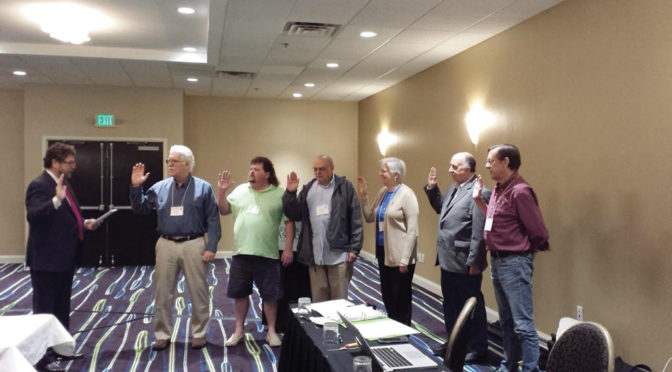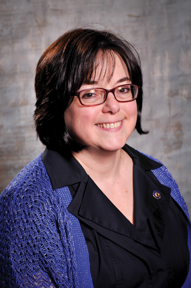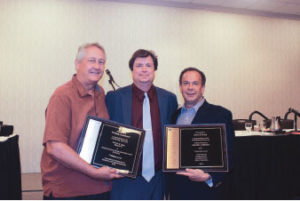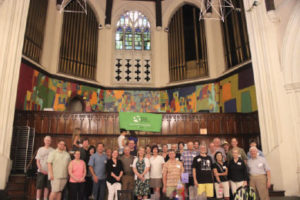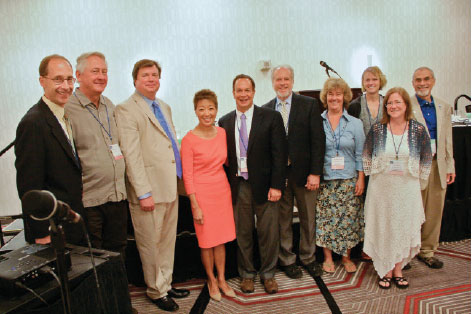by Mary Plaine, Eastern Conference Secretary-Treasurer and Secretary-Treasurer of Local 40-543 (Baltimore, MD)
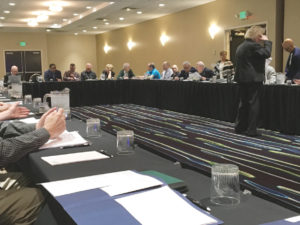
AFM staff and delegates of the Eastern Conference met in King of Prussia, Pennsylvania, April 22-23.
A historic meeting of Federation and local officers and delegates took place at the Valley Forge Casino Resort in King of Prussia, Pennsylvania, Saturday, April 22, when the Eastern Conference of Locals, comprised of locals from New England, New Jersey, New York, and the former Penn-Del-Mar-DC Conference, was called to order by Eastern Conference President Candace Lammers of Local 400 (Hartford-New Haven, CT). After a lot of work on the part of many people, it was gratifying to see 50 people sitting around the U-shaped table ready to attack a full agenda.
Following the opening business of the conference, the attendees heard presentations from AFM Secretary-Treasurer Jay Blumenthal, who spoke about the financial state of the Federation, and Department of Labor Investigator Nicolle Spallino, who spoke about locals and their need for financial safeguards, internal controls, and record-keeping.
AFM President Ray Hair brought the group up to date on several issues, including negotiations for Pamphlet B, the Sound Recording Labor Agreement (SLRA), and TV agreements. He spoke about changes in media consumption and the Federation’s new revenue streams to help underwrite the Special Payments Fund and the Music Performance Trust Fund (MPTF). Then, Hair was joined by employer and employee representatives for a discussion of the AFM-Employers’ Pension Fund.
AFM Legislative and Political Director Alfonso Pollard reviewed the many issues he has been wrestling in our nation’s capital: copyright and intellectual property legislation, instrument carry-on rules for domestic and international travel, national “right to work” legislation, and immigration.
Labor Attorney Harvey Mars closed Saturday’s business with the address, “The Impact of the Trump Administration Upon Labor in the Arts and What We Can Do About It.” Mars stressed three actions Federation musicians should take to keep themselves strong: fight for the NEA and other federally funded arts and cultural programs; fight for the right to be treated as employees and not independent contractors so that we can receive our full rights under Section 7 of the National Labor Relations Act; and fight to protect the right to organize and to protect union security—fight against right to work legislation. (See page 6 for a longer synopsis.)
On Sunday morning, the first speaker was MPTF Trustee Dan Beck, who updated the conference on the activities of his organization. Following Beck, two Federation employees, Symphonic Services Division (SSD) Director/Special Counsel Rochelle Skolnick and Touring/Theatre/Booking Division Director Michael Manley, gave presentations.
Skolnick described the personnel and operations of the SSD. She spoke about the SSD Resource Center in the For Members/Document Library section of the AFM website. She explained that serving as one of the AFM’s three in-house legal counsels allows for more efficiency as the AFM aggressively enforces its media agreements. She then reviewed recent legal actions.
Skolnick also spoke about the Federation’s new three-part approach to local officer training: webinars; two days of education held prior to the regional local conferences; and three-day intensive retreats to foster mentorships and peer-to-peer help. Well-trained local officers are more important than ever in strengthening the Federation and providing support to our members.
Manley’s presentation was “Freelance for Hire, Gig Organizing Strategies for Local Officers.” He addressed work not covered by collective bargaining agreements, such as single engagements of musicians hired to back up touring artists (Idina Menzel, for example) or productions such as The Legend of Zelda. Manley encouraged local officers to become familiar with contractors, venues, and peer unions in their jurisdictions, and to know what events are taking place in the venues.
Additional conference business included the adoption of new and revised bylaws and the election of officers. The current Eastern Conference Board is: President Matthew Cascioli, secretary of Local 45 (Allentown, PA); 1st Vice President Tom Olcott, financial vice president of Local 802 (New York City); 2nd Vice President Pat Hollenbeck, president of Local 9-535 (Boston, MA); 3rd Vice President Tony Scally, president of Local 16-248 (Newark/Paterson, NJ); 4th Vice President Michael Angelucci, president of Local 341 (Norristown, PA); and Secretary-Treasurer Mary Plaine, secretary-treasurer of Local 40-543 (Baltimore, MD).
Many thanks to all the people who helped bring the Eastern Conference to life, with a special thank you to Angelucci, who was the conference’s lifeline to the hotel.
Next year’s Eastern Conference is planned for April 14-15 and will again take place at the Valley Forge Casino Resort.


